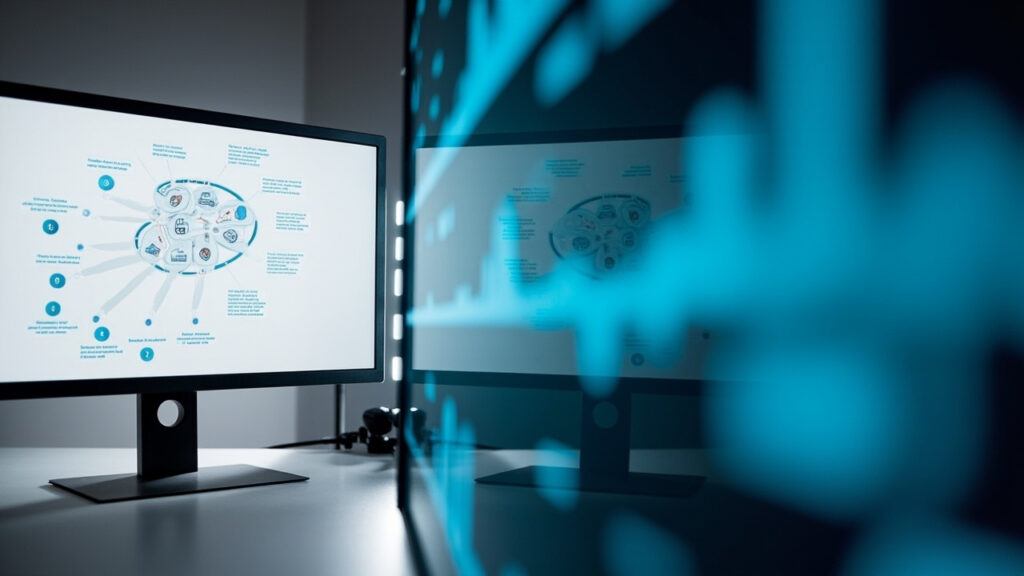In the rapidly evolving world of software development, maintaining high-quality standards is more challenging than ever. The complexity of modern applications and the speed at which they need to be updated or released have outpaced traditional testing methodologies. This shift has prompted developers and quality assurance (QA) professionals to turn towards more innovative solutions to keep up with the demands.
This comprehensive blog post will delve into the current landscape of software testing, the pain points faced by the industry, and how emerging technologies, particularly AI-powered tools like GenQE, are making strides in overcoming these challenges. By the end of this article, you will have a clearer understanding of how integrating advanced technologies into your development process can significantly enhance efficiency and software quality.
We will discuss the limitations of traditional testing methods, introduce AI-driven testing platforms, and examine the benefits and real-world applications of these technologies. Whether you’re a software developer, a quality assurance professional, or a project manager, this post will equip you with the knowledge and insights needed to navigate the complexities of modern software testing.
The Limitations of Traditional Software Testing
Traditional software testing has been crucial in ensuring the quality and functionality of software before it reaches the consumer. However, as software becomes more complex and integrated, the old methods start showing their limitations.
Inefficiency of Manual Testing
Manual testing, while necessary in certain scenarios, is time-consuming and prone to human error. Testers manually execute test cases without the assistance of tools or scripts, which can be inefficient for large-scale software projects. The repetitive nature of manual testing not only leads to increased chances of oversight but also contributes to tester fatigue, potentially compromising the quality of the software being tested.
Challenges with Automated Testing
Automated testing improves on manual testing by using scripts and tools to execute tests. However, traditional automated testing still requires significant setup, ongoing maintenance of test scripts, and can struggle with dynamic or complex user interactions. Moreover, automated tests are often brittle, breaking with minor changes in the application, leading to increased maintenance time and delayed project timelines.
Scalability Issues
Traditional testing methods do not scale well with the rapid development cycles of modern agile and DevOps environments. As the number of features and updates increase, the testing phase becomes a bottleneck, delaying releases and compromising the ability to respond quickly to market changes. This scalability challenge is exacerbated by the resource-intensive nature of maintaining and updating large suites of tests, which often leads to significant overhead.
The Rise of AI in Software Testing

To address the shortcomings of traditional testing, the industry is leaning heavily towards AI-driven solutions. AI in software testing can transform the process from being reactive to proactive, reducing the time and resources spent on test case design, execution, and analysis.
AI-Driven Test Generation
AI-driven test generation uses machine learning to create test cases based on user behavior, requirements, and past data. This not only speeds up the testing process but also ensures more comprehensive test coverage. By analyzing existing data and predicting potential problem areas, AI can generate focused tests that are more likely to uncover real, impactful issues.
Smart Test Execution
AI technologies can prioritize test cases based on the impact and risk analysis. This ensures that critical areas of the application are tested first, optimizing the testing efforts and resources. Furthermore, AI can dynamically adjust test plans in response to code changes, ensuring that the testing process remains relevant and efficient throughout the development cycle.
Advanced Defect Detection
With AI, patterns in data can be analyzed more effectively to identify defects. This proactive defect detection helps in catching issues early in the development cycle, reducing the cost and time to fix bugs. AI-driven tools can also predict potential future defects based on historical data, allowing teams to address issues before they become problematic.
Introducing GenQE: A Pioneer in AI-Powered Testing

Among the tools leading the charge in AI-powered software testing is GenQE. It stands out by offering comprehensive solutions tailored for modern development needs.
Key Features of GenQE
GenQE integrates several AI-driven functionalities to streamline the testing process:
- **AI-Driven Test Generation:** Automatically generates test cases, reducing dependency on manual efforts.
- **Smart Test Execution:** Prioritizes tests based on risk, ensuring critical issues are addressed promptly.
- **Self-Healing Automation:** Adapts to changes in the UI, reducing the time spent on maintaining test scripts.
These features collectively enhance the efficiency and effectiveness of the testing process, making it a valuable tool for any software development team aiming to improve their QA processes.
Benefits of AI-Powered Testing Platforms

The integration of AI into testing platforms brings several tangible benefits:
Faster Time to Market
By automating repetitive tasks, AI-driven testing shortens the development cycle, allowing for quicker releases. This rapid turnaround is crucial in today’s competitive market, where businesses must continually innovate and improve their offerings to stay ahead.
Enhanced Accuracy
AI minimizes human error, enhancing the reliability of tests and the software being tested. By automating both the generation and execution of test cases, AI-driven tools can achieve a level of precision and consistency that is difficult to match with manual processes.
Scalability
AI-powered tools can easily adapt to changes in project scope and complexity, making them ideal for enterprises. Whether scaling up for a large project or adjusting to smaller, more frequent updates, AI-driven testing platforms can handle the dynamic nature of modern software development without sacrificing quality.
Real-World Applications of AI in Testing

To illustrate the practical benefits of AI in software testing, let’s consider a few case studies:
Case Study 1: E-Commerce Application
An e-commerce company used AI-driven testing to automate and optimize their checkout process. The result was a 50% reduction in bugs reported after deployment, and a faster time to market for new features. This not only improved the user experience but also boosted the company’s reputation by providing a more reliable, efficient service.
Case Study 2: Healthcare Software
A healthcare software provider implemented AI to enhance their testing processes. This helped them comply with strict regulatory requirements by improving test accuracy and coverage. The AI tools were able to simulate complex patient interactions, ensuring the software performed reliably under a variety of scenarios, which is critical in healthcare applications.
These examples demonstrate the real-world effectiveness of AI-powered testing solutions in enhancing software quality and operational efficiency.
Conclusion: Embracing the Future of Testing

The landscape of software testing is undeniably changing, driven by the complexities of modern software and the need for faster development cycles. AI-powered testing platforms like GenQE are at the forefront of this transformation, offering solutions that significantly improve the efficiency, accuracy, and scalability of testing processes.
For organizations aiming to stay competitive in today’s fast-paced software market, adopting AI-driven testing tools is not just an option; it’s a necessity. By leveraging these advanced technologies, companies can ensure higher software quality, faster time to market, and overall improved customer satisfaction.
As we continue to witness advancements in AI and machine learning, the potential for further innovation in software testing remains vast. It’s an exciting time for developers, testers, and technology leaders to explore these new frontiers and redefine what is possible in software quality assurance.
Explore how GenQE can transform your testing processes and help you achieve unparalleled efficiency and accuracy in your software development efforts.
Discover More Innovative Solutions
Want to learn more about the tools and technologies discussed in this article? Explore how these innovations can be tailored to your specific needs and workflow requirements.
Our team of experts is available to answer your questions and provide personalized insights into how modern solutions like GenQE can address your specific challenges.